

#Markdown meaning code
Large $\LaTeX$ equations that do not fit inline within a paragraph may be written as display equations using a fenced code block with the "language" math as in the example below. As with unordered lists, ordered lists can contain nested toplevel elements. Two ordered lists:Īn ordered list may start from a number other than one, as in the second list of the above example, where it is numbered from five. Ordered lists are written by replacing the "bullet" character, either *, +, or -, with a positive integer followed by either. In the above example the fenced code block must be indented by four spaces to align with the i in item two. The contents of each item in the list must line up with the first line of the item. A blank line should be left between each list item when including any toplevel elements within a list. Lists can contain other nested toplevel elements such as lists, code blocks, or quoteblocks. Note the two spaces before each * and the single space after each one. Unordered lists can be written by prepending each item in a list with either *, +, or. Prepending a ! character to a link will display an image from the specified URL rather than a link to it. The syntax for images is similar to the link syntax mentioned above. Quoted blocks may themselves contain other toplevel or inline elements. Note that a single space must appear after the > character on each line. > technical computing, with syntax that is familiar to users of other > Julia is a high-level, high-performance dynamic programming language for Text from external sources, such as quotations from books or websites, can be quoted using > characters prepended to each line of the quote as follows. "Fenced" code blocks, as shown in the last example, should be preferred over indented code blocks since there is no way to specify what language an indented code block is written in. It's good to include cross references to mutating/non-mutating versions of a function, or to highlight a difference between two similar-seeming functions.

This will create a link in the generated docs to the parse documentation (which has more information about what this function actually does), and to the nothing documentation. Or if the string does not contain a valid number. Like but returns either a value of the requested type, It's also possible to add cross-references to other documented functions/methods/variables within the Julia documentation itself. Links to either external or internal targets can be written using the following syntax, where the text enclosed in square brackets,, is the name of the link and the text enclosed in parentheses, ( ), is the URL. Alternatively, in order to avoid escaping, it is possible to use the raw string macro together with the macro: raw"``\LaTeX`` syntax in a docstring." functionname Links

The \ character should be escaped appropriately if the text is embedded in a Julia source code, for example, "``\\LaTeX`` syntax in a docstring.", since it is interpreted as a string literal.



 0 kommentar(er)
0 kommentar(er)
